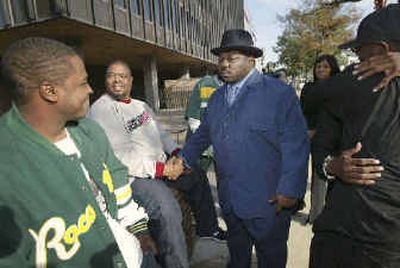From behind bars

In the rap world, a criminal background is the ultimate résumé.
The former drug dealer Beanie Sigel, who spent years bucking the law before getting his big break as a Jay-Z protege, has never lacked for street cred. With his menacing glare and criminal-minded rhymes, the Philadelphia native positioned himself as one of the most authentic gangstas on the rap scene.
But last year he was sentenced to a year in prison on a weapons charge, and still faces a retrial on an attempted murder charge (the first case ended in a mistrial last fall).
Now, as he releases his latest album from behind bars, Sigel is among a number of high-profile rappers who are finding out whether a criminal present is as lucrative as a criminal past.
For Siegel, so far, so good. His new album, “The B.Coming,” entered the Billboard albums chart at No. 3 this week. That’s his highest chart debut ever, although the 131,000 copies sold is below what his previous release, “The Truth,” sold in its first week in stores five years ago.
But with the exception of arguably rap’s greatest artist – Tupac Shakur – most rappers who have done significant time have been unable to sustain their careers or revive them after being released.
And while some have suggested that Lil’ Kim, who was recently convicted of perjury, will gain more street cred if she goes to prison, the examples of rappers like Shyne suggest otherwise.
“There’s no credibility in going to jail,” declares Damon Dash, who started the Roc-a-fella label with Jay-Z. “I don’t think it’s ever a positive thing and I would never advocate anybody going to jail, and I don’t think Beanie would ever advocate it.”
Dash talks a lot about what Sigel says and thinks, because Sigel can’t do it himself. He’s in solitary confinement (which Dash blames on overzealous corrections officials), unable to promote “The B. Coming.”
So the charismatic Dash has become Sigel’s stand-in, doing radio spots, appearing on TV shows, conducting interviews.
“If they’re going to try to put him in a place where he can’t make money, we’re going to try to reverse that, where we benefit from it to some degree, even though there’s no real benefit from him being in jail,” Dash said. “But we’re going to make the best of it, like making lemons into lemonade.”
Sigel (born Dwight Grant 31 years ago) has already made plenty of lemonade. Before he was sentenced, he finished three albums worth of material, several music videos and filmed his starring role in Dash’s crime drama flick “State Property II.”
Dash even recorded Sigel’s attempted murder trial and his entrance into prison for documentary fodder; some segments have already been shown on BET and MTV.
“We had to do enough music to keep him prevalent in the market while he was gone,” Dash said, “because we didn’t know how long he’d be gone.”
While a number of high-profile rappers have been charged with crimes at the height of their fame – including Eminem, P. Diddy, Jay-Z and DMX – few have been sentenced to significant prison terms.
Those who have – including Shyne, ODB, C-Murder, Mystikal and Slick Rick – often see their careers slide.
Antoine Clark, editor in chief of F.E.D.S. magazine, which chronicles street criminals and rappers, says time behind bars may help boost a rapper’s tough image but won’t help sell more records.
Clark pointed to Shyne, who was charged along with mentor P. Diddy in a 1999 nightclub shooting. While Diddy was acquitted, Shyne – who had impressive success as a debut artist before his criminal troubles – was sentenced to 10 years for wounding two people in the disturbance.
Last year, Island Def Jam signed the incarcerated rapper to a reported $3 million record deal, and he released the album “Godfather Buried Alive,” which contained some raps he recorded from prison over the telephone.
Yet the album didn’t even go gold, and was considered a major disappointment. In March, a judge froze Shyne’s assets until lawsuits filed by victims in the case are resolved.
“These rappers, they somehow have it twisted, they think that if they go to prison, we’re going to love them more,” said Clark. “It doesn’t really happen like that.”